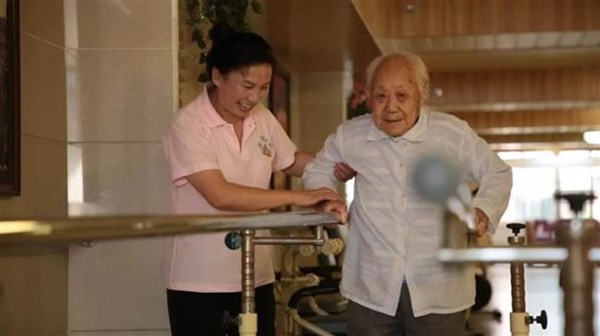今日上海
关爱老年群体 - 2018年11月09日
With a heart, caring for the elderly

China, facing an aging population, needs to double the number of nursing homes beds by 2034 to 289 million, according to a latest Asian Development Bank brief.
Some people are ahead of the curve in modern care for older residents.
“We need to treat the elderly as humans,” said Sun Huizhen, dean of the Jiwang Nursing Home in Minhang District. “Nursing homes aren’t companies, and the old people aren’t products. We can’t try to make profits from the elderly.”
Sun, formerly the director of Huacao Town’s Working Commission on Aging, has spent 18 years at the frontline of care for the elderly. She has been honored as a “beautiful person” by authorities.
Sun said she realized that elderly persons living in nursing homes aren’t the ones at most risk. Rather, attention needs to be focused on the disabled elderly who have lost basic selfcare abilities.
After retiring in 2008, Sun said she determined to open a nursing home to handle elderly with disabilities and those suffering from Alzheimer’s disease. There are 224 elderly living in the Jiwang Nursing Home, and four-fifths of them need 24-hour care.
When the old Huacao Nursing Home was being demolished, Sun took charge of 100 elderly residents at a cost lower than government requirements.
“At the time, I visited many elderly who either couldn’t afford nursing home care or were rejected by homes,” said Sun. “I felt sorry for them. Everybody is going to be old someday. I think people deserve the dignity of enjoying the last days of their lives.”
Sun spent more than 5 million yuan (US$722,762) on renting and remodeling a facility. Enterprises like Aurora donated money and furniture to the nursing home. Jiwang was committed to providing care on par with the level of care that would be provided for children. Indeed, facilities in the home are so safe that even children can use them, according to Sun.
When the Jiwang Nursing Home opened in 2009, it charged a monthly fee of only 1,230 yuan per person. Elderly with disabilities had only to pay 800 yuan on top of that.
One resident is Shen Caifang, a 70-year-old patient with a history of strokes. She was sent home from hospital by doctors who said they couldn’t do anything more for her. Sun visited Shen and eventually brought her to the Jiwang Nursing Home.
After three years there, Shen’s condition improved greatly, surprising even the doctor who diagnosed her earlier.
The Jiwang Nursing Home established a management committee comprised of representatives of family members and the elderly themselves.
One member of the committee once wanted to end his life after he lost the ability to care for himself. After years of medical treatment and psychotherapy at the nursing home, he can now go out by himself in a wheelchair and he has become socially active with other people on the committee.
The Minhang Jihong Elderly Service Center provides meals, health management, rehabilitation therapies and entertainment for residents of the Jiwang Nursing Home. Sun also invites nurses to give classes to care workers and asked experts from Changhai Hospital, one of Shanghai’s leading hospitals, to act as health consultants.
The nursing home was rated as a third-grade facility in 2015 by the Shanghai city government.
